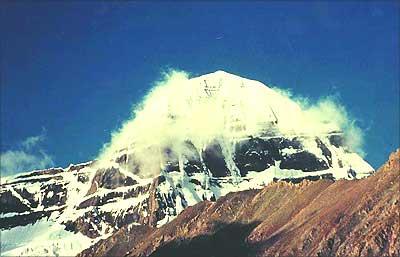
When news appeared earlier this year that China has cancelled this year's yatra, thus, it cast a pall of gloom not merely on those who had planned to make the trek this year, but on the community at large -- for even those who cannot go derive a measure of satisfaction from the knowledge that the experience is there, that others are savoring it, and that sooner or later, their turn will come.
Thanks largely to the efforts of our Foreign Secretary Shiv Shankar Menon, the Chinese government has agreed to allow the yatra to proceed in batches, on a revised schedule -- irrespective of the nature of government in New Delhi, our external affairs ministry boasts dedicated officers like Menon, who leave no stone unturned to ensure that the yatra is always on schedule. It needs pointing out that though the Chinese have cancelled all batches originating in Kathmandu, for fear of Tibetan infiltration into the group, they have allowed Indian pilgrims to make the journey.
I guess we need to thank the Chinese for allowing us to continue with our most revered pilgrimage -- though Shiva is a Hindu god, Tibet falls in their territory. Then army chief in Kashmir General Zoravar Singh had tried in 1841 to bring Kailas back to India; he in fact won the first phase of the battle and annexed the Kailas Manasarovar region into Maharaja Ranjit Singh's territory - but then winter intervened, and the enemy got the better of him in the treacherous climate.
Such was his bravery, however, such the heroism he displayed before dying in battle, that the Tibetans were moved to build a monument for him at Toya village near the Kailas route, adjoining Taklakot. The flag that General Zoravar Singh's soldiers brought back from Tibet is called the flag of Mantalai (Manasarovar), and forms part of the glorious heritage of the Jammu Kashmir Rifles. A military fort near Leh has also been named after General Singh.